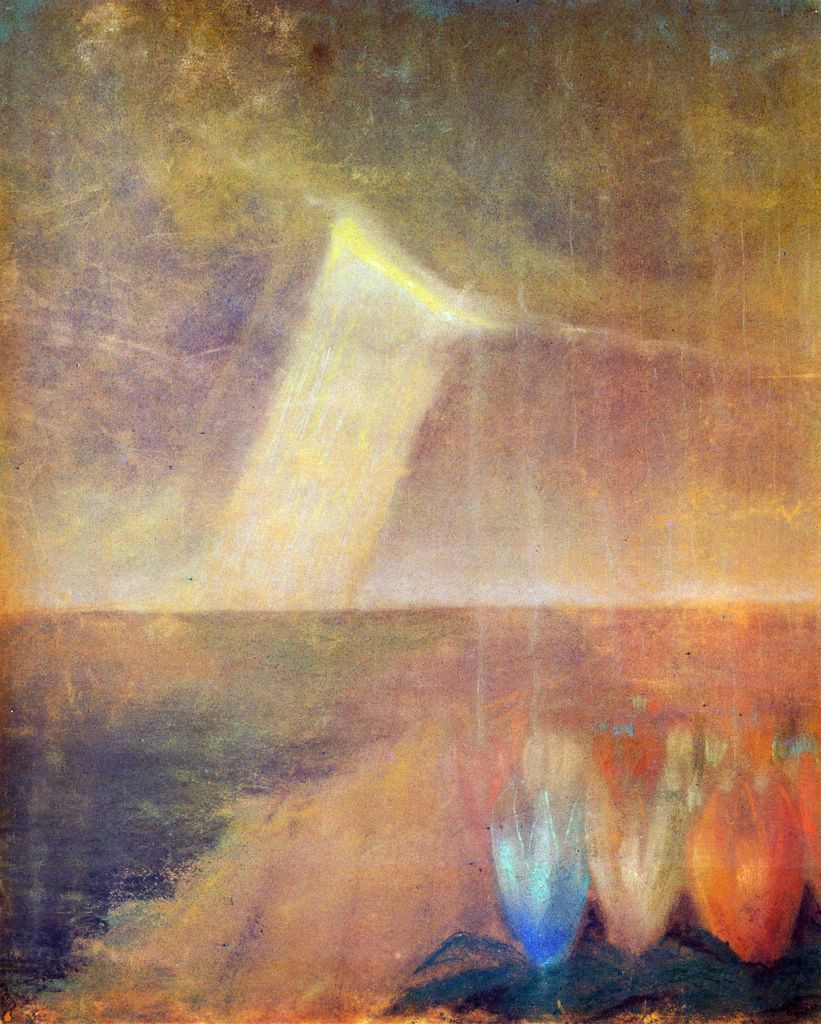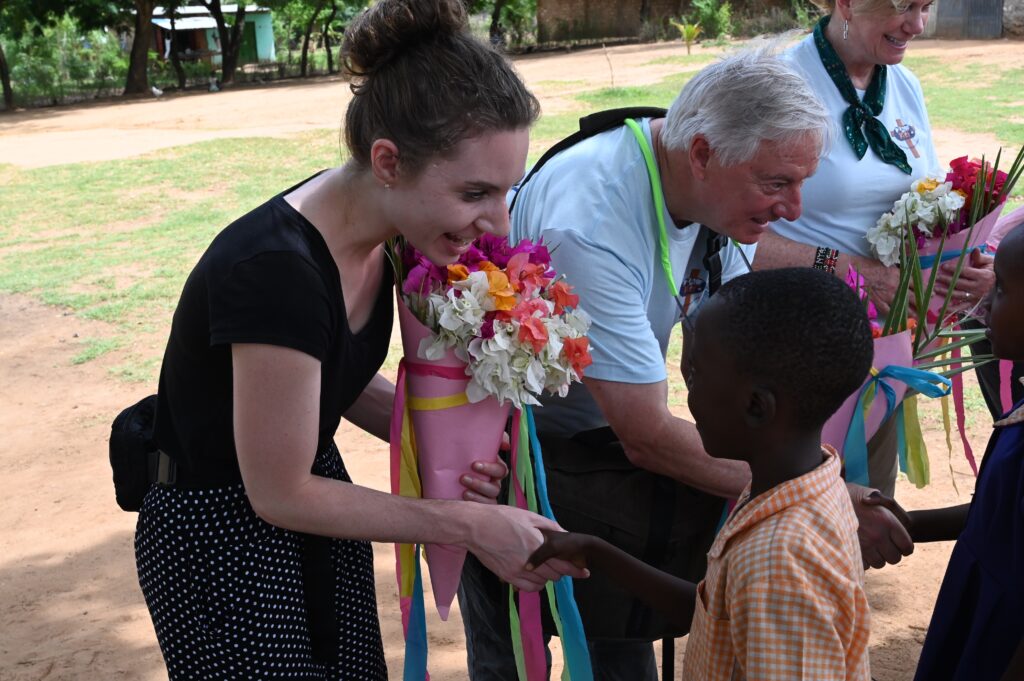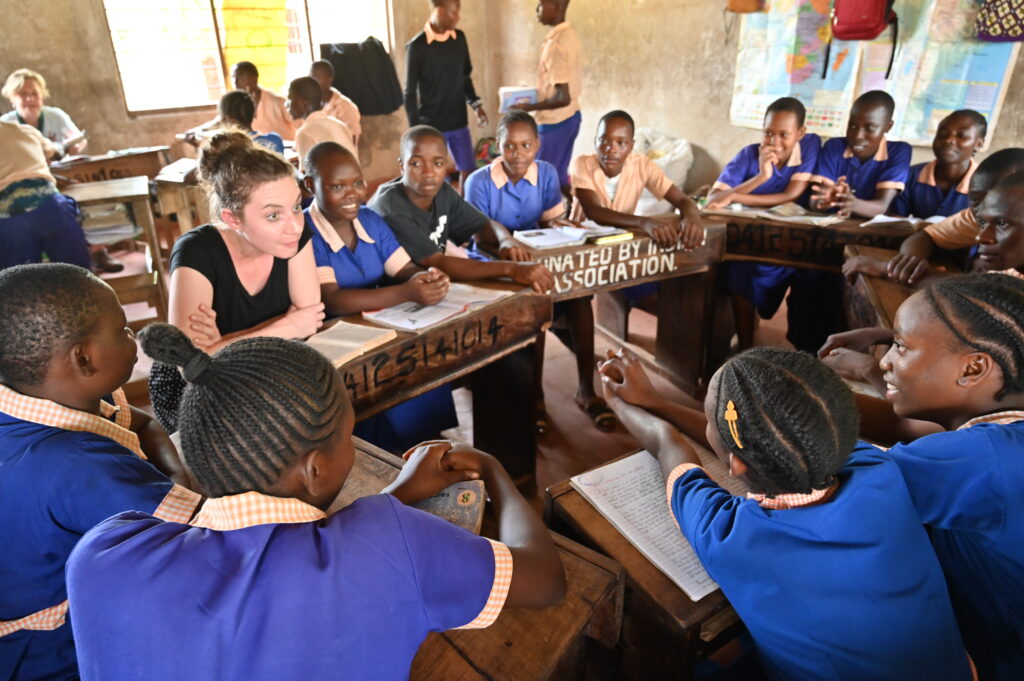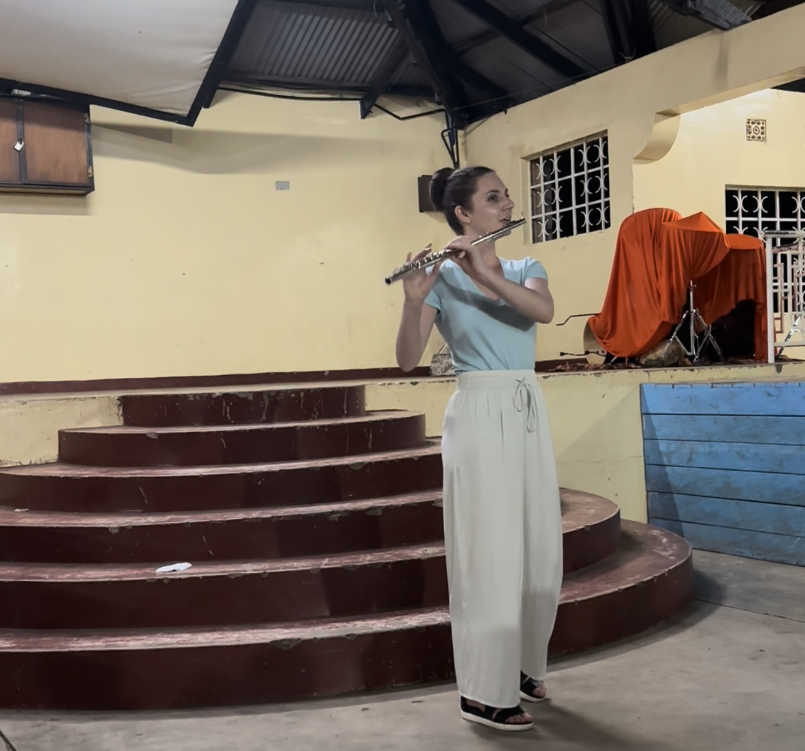
I went to a wedding in early April.
It was six days before Good Friday, which was also the day I flew to Kenya.
Seven days before Holy Saturday.
Eight days before Easter.
Nine months after my wedding was supposed to be.
It was the first wedding I attended after my engagement broke. The basic tasks of parking my car in the windy Atlanta spring and walking to the venue felt impossibly foreign.
Inside, I took a spot by the aisle. It was lined with flowers in small vases. The poppy next to my seat at the end of the row looked up wide-eyed and oblivious in its yellow glory. Together, we watched the story that was once promised to me come true for someone else.
And, oh—my friend was beautiful. Her veil, draped across her shoulders, had pearls in it. The groom began to cry as she approached him. Hope and joy and sadness welled in my eyes, too.
—
Six days later I went to church for our midday Good Friday service. It wasn’t very crowded, which made the low-lit room on a bright afternoon seem intimate.
My pastor began the service by sharing what happened the night before in the Garden of Gethsemane. Jesus got a foretaste of the sorrow and suffering that awaited him. It was enough to make him sweat blood, to plead for another way. The horror of his own deep death drew nearer and then came on Good Friday: Trial, condemnation, the murder of the Son of Man. Nails through wrists.
—
A few hours later, I was high above the Atlantic. Good Friday became Holy Saturday. Two thousand years after Jesus’s body lay in a tomb, I ate a croissant in Amsterdam and got on another plane. We arrived in Nairobi late, late at night, weary travelers.
A two-hour drive was the final leg of our journey. We hauled our luggage into a converted safari vehicle with the words Mully Children’s Family painted white against its green doors. I kept my flute—shoved into my carry-on at my boss’s insistence—on my lap and then, when my legs got tired, locked it between my ankles. As we drove, the only lights around us were the occasional neon glow from nightclubs and fires in tall metal trashcans, usually with huddles of people around them even though it was warm outside. Once, further away from Nairobi, we saw the even dots of lampposts outlining a wealthy coffee plantation.
As we continued southwest, the sky opened up. I’d never seen a southern hemisphere display of stars, God’s handiwork from that perspective.
—
The long and short of how I ended up in a converted safari vehicle on a dirt road in Kenya in the hours before Easter is that when my heart broke last summer, the only thing I wanted to do when I wasn’t weeping was write. Sentence structure was my balm, forcing my tears into the shape of a story. In my better moments, I was convinced that even if my personal mountain of grief crushed me, writing about it might help me discover a vein of gold within it. In my worst moments, I was returning to the only place that felt like home anymore: a blank sheet of paper and a pen.
It took me six months to capture my heart in 2,448 words and three hours for me to hit the publish button. The level of exposure unnerved me, and I tried not to think about it. But, a few days later, my phone kept dinging. Through a series of events I have yet to untangle, a major Christian publication shared that article. After I caught my breath, I texted my pastors the news. They happened to be with an elder at my church who, unbeknownst to any of us, was looking to hire someone for a writing position…with a Christian ministry that saves the lives of children in Kenya.
This chain of events makes me question my questions about God’s goodness because I can see him working in unexpected and miraculous ways. And yet the bumpy ride to Ndalani, Kenya mirrored my own heart: one moment exultant that God had redeemed my sorrow in an incredibly beautiful way, the next finding myself near tears, longing for someone with whom I could share the upside-down beauty of that starry night.
—
A choir woke me up on Easter Sunday. The rising melodies drifted into my guestroom as if they knew they were invited. Willing my body against the jet lag, I changed into a black cotton dress. The music got louder as I walked to the chapel until, stepping inside, I was enveloped in praises to the God who rose from the grave. Now I was wide awake.
The chapel was a tall concrete building with a tin roof and red circular steps leading to the stage. The choir was dressed in clothing of every color, and half of them wore Crocs. They danced as they sang, lifting their hands in unison. Heaven-singing, I thought, that rare type of worship that is truly self-forgetful. Their songs were mostly in Swahili and impossible for me to follow, but a part of my soul that I never knew existed told me that it was home.
At the same time, I knew the stories of the voices I heard. Every imaginable trauma had a face on that stage. You could see the effects of the streets, of abuse and starvation, written across some of their bodies in scars and bones. They, at least, had been able to silence the lies that seemed written across my heart in stone, impossible to be erased by even the miracle of being in Kenya in the first place. God does not love you. God does not care about you. God is indifferent to your pain. I recalled my tearful words to my pastor months before: “I don’t believe God will ever heal me.”
“What do you mean by healed?” he had asked me.
“That I will ever be whole again.” The words had rolled off my tongue that day as if I’d rehearsed them. The conviction that I would never be whole ran deep.
And there I was on Easter Sunday, seeing the inevitable result of the wholeness and healing that seemed to elude me: worship. But even if I could follow the children’s songs, I knew I couldn’t sing like they did. They trusted in a God I still wasn’t so sure about.
—
“You don’t have to be nervous,” my boss said. “When you play the flute, you’re not performing. You’re just playing for family.”
“Okay,” I said, completely unconvinced. I twirled a ribbon of sauteed kale around my fork—the breakfast of choice in Kenya—and nodded. My face had betrayed me, though—just the thought of pulling out my flute in front of a thousand children made my stomach churn.
“It will be a way for them to get to know you,” he said, sensing my inner tension.
“I’m happy to do it.” It was true even though I dreaded it. The last thing I wanted was, of course, to be known.
But I had a more immediate problem: I needed to figure out what to play. Unsure which songs the children knew, I began to ask God to point me to the right hymn.
That evening, I sat against a scratched yellow wall in a classroom with over a hundred little ones during their devotional time. Five-year-olds recited entire chapters of the Gospels and prayed aloud, all together. Within them was a type of reverence and love I had never seen in my own heart, and I wondered what it was like to depend on Jesus for everything. Then, near the end of their service, about twenty gathered to the front and sang in their tiny voices “Nothing But the Blood of Jesus.”
—
The next day, I met Jane. I was walking along the children’s playground with feigned purpose. I’d mistakenly taken an antimalarial before eating anything that morning, and my stomach felt squeamish on top of the residual jetlag. On top of that, I have never been particularly good with children and usually get nervous around them. The only thing I can do that might have any appeal to a child is make paper cranes and (girls only!) wear sparkly nail polish. But, that day, I didn’t have a piece of paper on me, and I’d worn my nails plain to Kenya.
Apparently, none of that mattered to Jane, who spotted me and ran. Probably around ten years old, she was wearing a pink Barbie dress and white Crocs. Sweat made her forehead glisten as if she were wearing a crown.
I welcomed the interruption to my inner dialogue as she held out her hand. I grasped it. We introduced ourselves. Then, without warning, she stopped walking, looked me squarely in the eye, and said, “I love you so much.” The conviction in her voice took me off guard. I wondered if I’d ever loved anyone how Jane loved me in that moment.
If God loves me like Jane loves me, that would be enough.
“I love you too, Jane.”
She ran off after a few moments to play with some friends. She didn’t want anything from me—she wanted to give me something.
—
A few days later, we went to Mombasa on a propeller plane, catching a glimpse of Mt. Kilimanjaro as we flew eastward. Then we traced the line of the Kenyan coast, headed north in a white van. I could nearly touch the small, rocky mud huts outside my window.
The sun was skipping between the clouds, and I took off my sunglasses. As I held them in my hand, I realized with a sickening thought that my sunglasses—designer, polarized, prescription, anti-glare on the back lenses, are you kidding me?—cost me more than the village families would earn in an entire year.
The first sign that we were nearing Vipingo, the site of a school supported by Mully Children’s Family, was an anomaly: a massive tree, its arms stretched out high over the village. I’d been told that it was once the site of witchcraft rites. Now, in its shade, a young boy in a checkered orange collar handed me a bouquet of orange, white, and fuchsia bougainvilleas. He looked away as he introduced himself as Khamisi. I accepted the bouquet, shook his hand, and smiled.
 Our team introduced ourselves to the teachers, and then the teachers introduced us to their students, who soon divided up the room and invited us to sit with them. They told me the story of Moses and their dreams for their futures. They asked if I had a car (yes, a little red Toyota), if I have a pet (no, but I like other people’s dogs and cats), and if I had siblings (one little brother, Spencer). Their questions came one after another until one—or perhaps how I paused before I responded to it—made everyone go silent.
Our team introduced ourselves to the teachers, and then the teachers introduced us to their students, who soon divided up the room and invited us to sit with them. They told me the story of Moses and their dreams for their futures. They asked if I had a car (yes, a little red Toyota), if I have a pet (no, but I like other people’s dogs and cats), and if I had siblings (one little brother, Spencer). Their questions came one after another until one—or perhaps how I paused before I responded to it—made everyone go silent.
“Have you ever had bad news, Olivia?” a boy named John asked me.
The genuine curiosity took me by surprise. The next feeling was shame, wondering if my story would mean anything to children who had known types of suffering I could never truly comprehend. “I have,” I said, pushing past the quiver in my voice. “I once had something happen to me that made me wonder if God loved me at all. You asked me if I was married a minute ago, and I’m not. But this time last year, I was engaged…” So, the story about the worst news I’d ever received came, briefly, carefully, with a tremble.
“I’m so sorry,” the children told me, one after another.
“But let me tell you what God did next. Did you know God used that bad news to bring me to you?”
 Later in the day, our team returned to our van. The bougainvilleas rested on the seats. I took them in my hand and had a flashback to my engagement bouquet of yellow tulips, overnighted to Atlanta from a California flower farm. My story will never again be only a sad story; it is a story that God is redeeming—look at me here. Look at my wild bougainvilleas, held together with construction paper and colorful ribbons and love that overflowed.
Later in the day, our team returned to our van. The bougainvilleas rested on the seats. I took them in my hand and had a flashback to my engagement bouquet of yellow tulips, overnighted to Atlanta from a California flower farm. My story will never again be only a sad story; it is a story that God is redeeming—look at me here. Look at my wild bougainvilleas, held together with construction paper and colorful ribbons and love that overflowed.
—
“I want to introduce you to my friend Olivia. And she has something special to share with all of you tonight.”
I walked with my old silver flute to those familiar red steps. The children gasped when they saw it. I had polished it the night before until it shined like a mirror. At least it will look pretty. My heart pounded condemnation as I stood in front of everyone: Here I am, about to play a hymn about the healing power of Jesus when every single person here understands it better than I do.
I took a breath—and then another—and played the opening line of “Nothing but the Blood of Jesus.” What can wash away my sin? The concrete chapel made it sound rich and deep. I relaxed; the acoustics would be forgiving if I made a mistake. I went on to the next line, and then, completely unprompted, a thousand voices joined in:
“Nothing but the blood of Jesus,” everyone in the chapel sang.
Their voices hit me like a wave of hope. I ignored the tug in my throat. It was impossible to play and cry at the same time. They sang with the same pure conviction I had marveled at on Easter Sunday. But this time, I had found my voice, too. The next line came:
“What can make me whole again?
“Nothing but the blood of Jesus.”
Whole again.
Why was I leading them in a song that declared precisely the doctrine I found impossible? I have no explanation. Maybe God knew that I needed a thousand children from Kenya to preach to me, to sing back to me a melody I played but didn’t believe, for his truth to finally pierce my heart. Maybe God accepted my feeble offering, my own little faith, my own mess and brokenness. Maybe God loved my shiny flute.
 —
—
In Corrie Ten Boom’s famous book The Hiding Place, she shares the story of her and her sister Betsie’s imprisonment in Ravensbrück, a brutal concentration camp in Germany for political prisoners. Their crime? Saving 800 Jews. Betsie falls ill, and a few days before her death, she tells Corrie,
We must tell people that there is no pit so deep that God’s love is not deeper still. They will believe us because we were here.1
I would prefer a world without those deep, dark pits. I do not understand why Jane does not have biological parents, why Khamisi’s school used to have holes in its floors, nor whatever bad news John once got that made him ask me that question. I don’t understand why a child would ever live on the streets. I do not understand the sadness I struggle with in singleness in the aftermath of a broken engagement. None of it makes sense to me.
But understanding is not a prerequisite to knowing that I am loved, here. CS Lewis once wrote,
I know now, Lord, why you utter no answer. You are yourself the answer. Before your face questions die away. What other answer would suffice?2
How could God’s face be so compelling? What could be greater than understanding? What could silence my questions or cast them into irrelevance? What could be deeper than my pain?
I do not have all the understanding I want, but I have learned the answer to these heart cries, and I’m learning to believe it, too: Nothing but the blood of Jesus. It’s there, on the cross, that Good Friday glory written in precious blood by the one who rose from the grave with scars on his hands. Unimaginable suffering unfurled the plan of redemption and defeated death. His resurrection means that love drips over the hills and valleys of my own heart—and the whole nation of Kenya.
And now our risen God rushes towards brokenness, towards you, towards me, no matter the mess we’re in, to tell us that we are his and we are wanted and we are loved. That we are whole because Jesus lives within us.
In Romans, Paul writes,
For I am sure that neither death nor life, nor angels nor rulers, nor things present nor things to come, nor powers, nor height nor depth, nor anything else in all creation, will be able to separate us from the love of God in Christ Jesus our Lord. (Romans 8:38-9)
This is what it means that God’s love is always deeper. It runs deeper than all the poverty in Africa, than all the hearts that have ever been broken in this world, than all the pain and suffering. For I am learning that in the kingdom of God, even the most wounded sing beautiful songs.
As for me, I will walk in the faithfulness that he alone supplies. I’ll play my flute in the most unexpected of places, I’ll smile whenever I see wild bougainvilleas, and I’ll remember in those hard moments that my savior is making me whole again, for his love is deeper still.
—
Learn More about Mully Children’s Family in Kenya
The Article on my Broken Engagement
About Olivia
© Olivia Davis 2023, all rights reserved.
Tim Ramey says
Aww Olivia, I love your heart for Jesus. Your very words scream the Name of Jesus. You are dear to me though I hardly know you. But to read your words, I realize I know you well because we both love Our Lord.
I wanted to add something; you wrote, “For I am learning that in the kingdom of God, even the most wounded sing beautiful songs.” No, I don’t think EVEN the most wounded sing beautiful songs; I believe that the wounded DO sing the MOST beautiful songs. Your singing has improved since I met you in RZIM years ago. You sing and write more beautifully than your favorite songbird. I’m sorry for a hurt that is terribly grievous to you. I ache for you. But if I do, think how much Your precious Jesus weeps for you!
Bri says
Reading this story was beautiful Olivia. Seeing things come full circle in less than 1 year is truly a testament that Nothing Is Too Hard For God!
This encourages me to open my eyes! I want to see how God is moving and healing not looking at the past or placing my thoughts on what could have been.
Linn says
Olivia,
This is a beautiful piece of writing that truly reflects God’s love and healing in difficult, unexpected circumstances.
I have a reverse story. 30 years ago I was a very happy single (emphasis on single) missionary in South America. It was all I ever wanted, and God gave me that wonderful experience. Then, due to a family emergency, I was suddenly flying home to the States to help my mother raise two grandchildren. I knew I would go back to SA someday, and then I had to accept it wouldn’t happen because my niece and nephew really needed me.
They’re grown up now and living happy lives. So am I! God put me in a Spanish-speaking church and community where I have thrived-and He has used me! Early on I realized that God was the only One who would get me through my sudden change in circumstances, but I had to trust and cooperate with Him in that transition. It wasn’t always easy (I cried a lot in private) and it wasn’t always what I wanted, but I needed to accept that God was up to something much greater than my desire to go back to South America. Now, I can see it and I am thankful for how He chose to work in my life.
Tyler Jeffery Carter says
Olivia,
I was very touched by your article. Like you, I also suffered a broken engagement last summer and it was probably the toughest thing I’ve ever experienced. Thankfully, the spiritual revival that it brought to my soul was worth it 100x over and I’m sure you could attest to the same.
After around a year of singleness, God answered my prayer and put a new love in my life and the lessons I learned from my last relationship and its subsequent ending have helped me tremendously in this current one
Even if you are still in a season of singleness, I want to offer encouragement. The trial of a broken engagement was sooooo painful, but it has enriched this relationship exponentially. In less than a year, your story and pain has already been used to advance his Kingdom and give hope to others, and I have no doubt that it will continue to do so.
In Christ,
Tyler
Bri says
This was a beautiful comment Tyler! Thank you for sharing. And it is so sweet to hear God blessed you with a new love <3